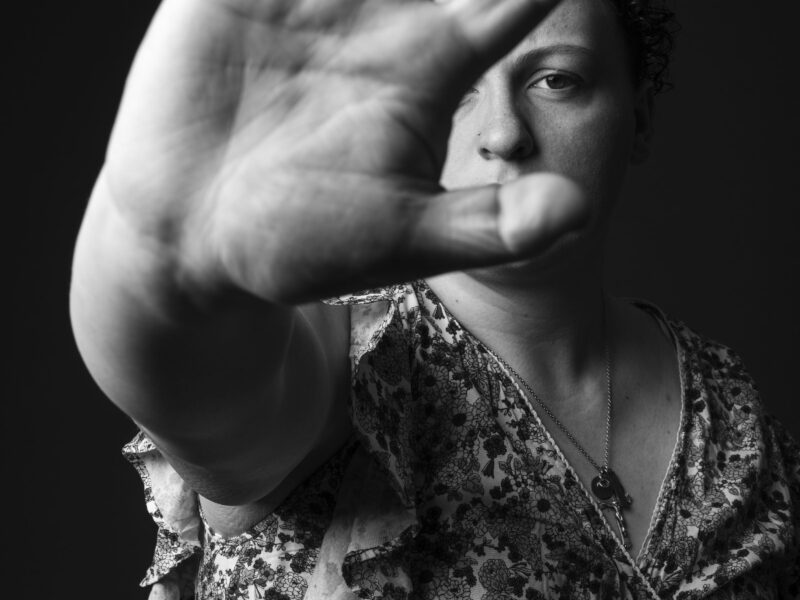

By Cailin Riley
When a draft opinion that confirmed majority support for striking down the federally protected right to abortion guaranteed by the landmark 1973 Supreme Court decision in Roe v. Wade was leaked on May 2, Sag Harbor resident Abigail Hallock, 19, opened up her Instagram account and posted a public Instagram story about something deeply personal.
In a series of posts, she spoke about being raped at 16, learning she was pregnant at age 17, and being faced, for a period of time, with the difficult choice of whether to seek an abortion.
The response to her posts, she said, was overwhelming, with people urging her to share her story more widely.
Whether to do that — and how — required some thoughtful reflection for Hallock. But, despite her trepidation, she said she chose to write a longer essay about her experience, and share it with The Express News Group for publication, because it connected with a core aspect of her personality.
“I feel happiest when I’m helping other people,” the Pierson graduate and local EMT said.
There were several motivating factors for Hallock: dispelling the myth that “something like this doesn’t happen here,” in the “bubble” of a small town like Sag Harbor; putting the focus on the mindset and all the factors that go into making the choice to seek an abortion, rather than just the ultimate choice itself; rejecting the discomfort it might cause others as a good reason to stay silent.
Writing the essay was “one of the hardest things I’ve ever done,” Hallock said. She had previously only told a few people what had happened to her, saying she wanted to avoid the “grief tour” associated with delivering that news to loved ones.
“You tell them this story and you watch the joy immediately wipe away from their face,” she said. “That’s really hard to take. You constantly feel like you’re hurting others by telling them.”
Sharing such a deeply personal and traumatic story publicly is terrifying, Hallock admitted. But she said it’s also liberating — and important.
“I know I don’t have to share my story now, but I feel like it’s impactful now, and timing is everything,” she said.
Hallock said she hopes the takeaway from reading her story is greater awareness — that many people are carrying private traumas with them, and they deserve respect, and autonomy.
“Just because someone hasn’t told you their story, doesn’t mean there aren’t people who have gone through something traumatic,” she said. “The choice to keep something private doesn’t mean our rights should be taken away.”
She added: “I want people to embrace survivors and people telling their stories, without judgment.”
Editor’s note: This article contains discussion of sexual assault, rape, and pregnancy loss.
By Abigail Hallock
Seventeen and scared.
I was barely old enough to get my driver’s license, and here I was sitting in an OB-GYN’s office, being told I was pregnant.
I thought back to the past two months and wondered how we got here.
The nightmares of that day came flooding back.
I was only 16 when I was violently sexually assaulted. I went to the hospital, I received Plan B and the prophylactic medications. I also was on birth control.
Yet, there I was, 17 and pregnant — with my rapist’s baby.
I didn’t know what to do. I didn’t tell my parents, because I was scared. I knew they would accept me and love me either way, but that doesn’t make the conversation any easier.
So, I sat and thought about my options.
I was already exhibiting symptoms of Post-Traumatic Stress Disorder from the attack. I was already struggling with my mental health, and I knew that this would surely push me over the edge. For years, I’d walked a fine line of living with my mental health, and I knew I just couldn’t do it.
Not able to make it more than 45 minutes without a panic attack, I sat alone in my room, tears streaming down my face, looking at the options.
I knew that to continue with the pregnancy, I would have to go off the psychiatric meds that had kept me afloat for the past six years. That wasn’t feasible. With the added hormones from pregnancy, the trauma from being assaulted and my preexisting mental health issues, I knew I wouldn’t make it through the pregnancy alive.
I’ve always known I wanted kids — but not like this. Not now, not from this situation.
Before I had the chance to make up my mind about what I was going to do, I suffered a miscarriage.
It was at that moment when my world came crumbling down even more. In a cruel way, the universe made the decision for me.
Having a miscarriage is not something I wish on anybody, regardless of the circumstances of conception.
And now I sit here, reading news headlines about Roe V. Wade being overturned — and I’m terrified. I’m terrified by some of the things that have been said by politicians about abortion and rape.
People don’t understand the consequences of overturning Roe V. Wade.
Forcing people like me to put their physical and mental health on the line to carry a child that holds half the DNA of their attacker is cruel. I still struggle with my PTSD to this day, and in the wake of all this news, I find myself struggling to stay afloat in these murky waters.
I urge you to understand the consequences of this action. Because you may ban legal abortions, but you’ll never stop people from having them. Overturning Roe V. Wade won’t end abortion — it will simply deny those with uteruses access to safe abortions.
I took all the precautions, I took the meds, and they still failed. I did everything in my power to prevent myself from getting pregnant, but it still happened.
I was put in an impossible position where I was being asked to choose between my mental health and the societal norm of bearing children. If I didn’t have a miscarriage, I would’ve chosen my mental health. What would be the point of bringing a child into this world if it cost me my life?
This is a story I prayed I would never have to tell. But in times like these, I can’t sit idly by and let other people make the decisions that will significantly alter the course of many lives.
 More Posts from Viewpoint
More Posts from Viewpoint